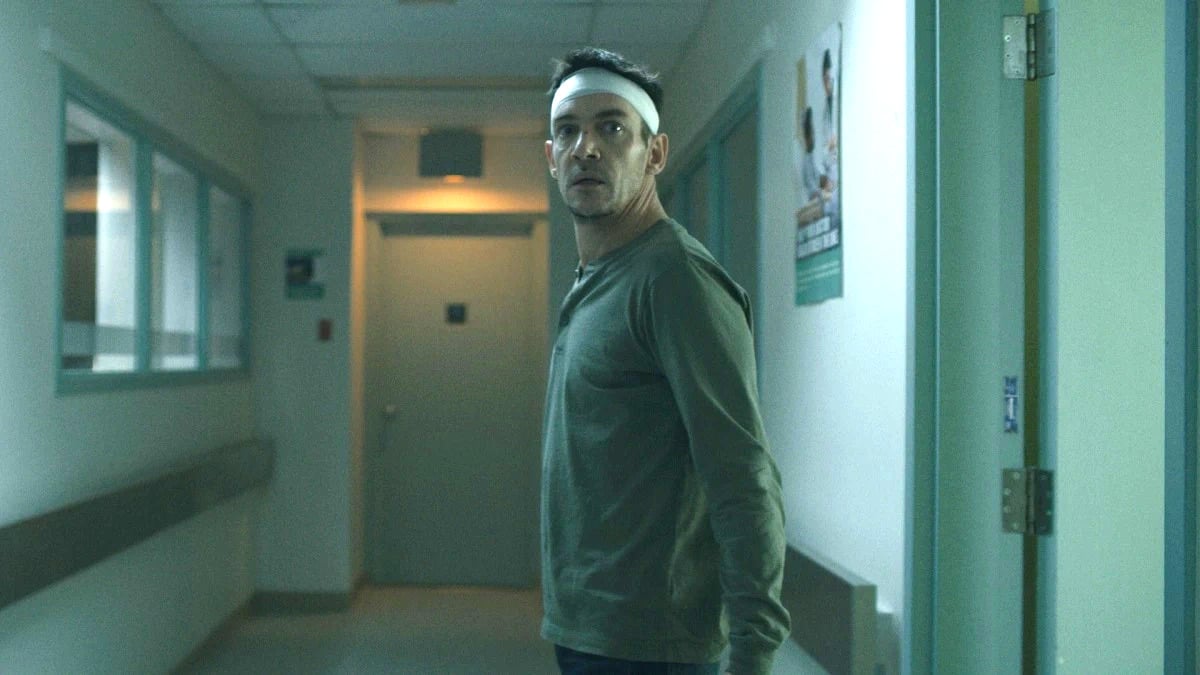Disquiet, from writer and director Michael Winnick is a subpar horror movie mashup featuring deserted hospitals, rampaging patients, and more than a little metaphysical subtext. When it hits theaters and on-demand from Feb 10, this B-tier psychological segue will provide just the right level of undemanding entertainment to audiences in need of light relief.
Sam (Jonathan Rhys Meyers) is successful, work obsessed, and married to Sarah (Anita Brown). After experiencing a near-fatal car accident in the opening minutes, he wakes up to find himself in an empty hospital and hooked up to a heart monitor, with only one elderly patient for company. Minutes pass before Sam finds his feet, unplugs his tubes, and attempts to venture out into the corridor. In a split second, the sedated older man is attacking him from behind, clinging to his back and screaming.
From that moment on, Winnick keeps his leading man on tenterhooks, as he battles a pensioner brandishing medical equipment, hot foots it into an elevator, only to have that same dead man punch his way through the ceiling in pursuit. With flashing fluorescent strip lights, off-kilter camera angles, and intrusive incidental music, Disquiet tries really hard to scare audiences.
Having made it onto another floor in this eerie medical facility, Sam encounters Monica (Elyse Levesque), who is under the knife for enhancement surgery. With reassurances from the surgeons performing her procedure, she goes under to awake moments later surrounded by ghoulishly pneumatic models bound in bandages. Threatening her with scalpels and trying their best to look terrifying, she escapes a little too easily into the arms of Sam.
As this newly-formed duo scramble away from the advancing models along a poorly-lit corridor, audiences will experience a penny drop epiphany where everything becomes clear. This horror-lite hospital drama feels more like a homage to Roger Corman than John Carpenter. Only the committed performances from its ensemble cast save Disquiet from being a certified car crash with no survivors.
As minimal amounts of flashback provide context to the journey these characters are going on, things make less and less sense. A morally ambivalent cop (Lochlyn Munro) joins them, followed by an innocent young man (Trezzo Maharo) who shares a connection with the policeman. Then, a female doctor (Rachelle Goulding) and wheelchair bound patient (Garry Chalk) join the entourage, as Sam battles to make some sense of what is happening.
Unfortunately, one of the main issues with Disquiet is its lack of anything horrific happening. With Corman-esque levels of production design in the hospital, some seriously cliched dialogue exchanges, and a philosophical segue squeezed in at the end, Disquiet feels longer than its eighty two minute running time. Only the bug-eyed desperation of Rhys Meyers as he runs around the corridors is worth the admission fee.
Subplots explained in flashback do little to expand on the minimal character arcs at play in this film, meaning that as a group these people remain little more than archetypes. Maharo does well to imbue Carter with a degree of innocence, when he is caught in the crossfire of a convenience store robbery, but beyond that no one digs any deeper.
Within that scene, Winnick makes heavy-handed statements on prejudice towards people of color, as rogue cop Frank assumes Carter is guilty without thinking. In truth, Disquiet is peppered with examples which lack the polish of other films in this genre. There is so little sophistication in the story telling at times, that after a while audiences will assume it is happening on purpose.
Only the wheelchair-bound Virgil brings genuine dramatic chops to the table here, offering sage advice to Sam and tying everything together with his fortune cookie intonations. In fact, as a movie Disquiet only really starts making sense in the final 15 minutes, when it moves away from trying to be a horror film and tries for something more profound.
Angelically-lit stairwells, stranded small children, and flashbacks to a hospital bed spoon feed anyone unsure of the underlying message. Social media messaging suddenly has the ability to reach across metaphysical plains, and ambiguity not closure is all that audiences are offered in conclusion. Perhaps suggesting that the filmmaker wanted to end his magnum opus with a little whimsy, rather than anything which might make more sense.
Whatever the endgame might be, there is no denying that committed performances aside, Disquiet is neither scary nor enlightening, making it more of a low-key hot mess salvaged by moments of leading man machismo.
Middling
Audiences are in low-key hot mess territory with this disappointing horror movie mashup featuring Jonathan Rhys Meyers. With badly-lit hospital corridors, possessed elderly patients, and a nonsensical plot which would work better in The Twilight Zone, 'Disquiet' is best avoided.

